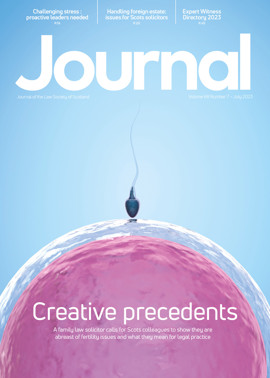Diploma admissions: a thorny issue
 Diploma in Professional Legal Practice providers wrestle annually with admissions. Those in the profession have differing views on the Diploma (providers have heard them all), but there is agreement on one fact: there are too many applicants for the number of places available.
Diploma in Professional Legal Practice providers wrestle annually with admissions. Those in the profession have differing views on the Diploma (providers have heard them all), but there is agreement on one fact: there are too many applicants for the number of places available.
Across the six providers, there are approximately 750 places available. For the past three years demand has outstripped supply. This year, there are around 1,000 applicants across the board.
Increasing Diploma places
One solution is to increase the number of Diploma places available. However, providers have a duty to the profession and are mindful of the accreditation standard which states that providers must have “awareness of the needs and requirements of the legal profession, including likely future trainee numbers across Scotland”.
Given current uncertainty, it may be irresponsible of providers to increase numbers to any great extent. Indeed, the Law Society of Scotland (“LSS”) wrote to providers in these terms in 2020 and 2021.
Diploma places therefore remain static, while demand continues to exceed supply.
Decreasing LLB places
Another obvious solution is to reduce LLB places. There are 10 LLB providers across Scotland and, anecdotally, LLB intakes have increased annually across the board.
However, not all LLB graduates wish to practise law. A considerable number go on to alternative careers. Therefore, it may be unfair to restrict access to the LLB.
Ranking applicants
On the basis that neither of the above is feasible, providers make offers in the knowledge that a proportion of applicants will be unsuccessful.
Historically, applicants to the Diploma were ranked solely based on their results in foundation subjects (for most, subjects studied in first and second year). These are the subjects accredited by the LSS and in which those seeking an entrance certificate must demonstrate a pass.
On the one hand, this approach is both fair and consistent, i.e. there is a level playing field, in that all applicants will have a grade point average (“GPA”) across foundation subjects.
On the other hand, providers are aware of other relevant factors. Each of these factors, of course, presents its own challenges.
Honours results
Applicants are generally keen for their honours results to be considered. Of course, not all applicants will have completed honours. Some have completed LSS examinations, some have ordinary degrees, while others have completed accelerated (two year) LLB degrees, so have honours in different, often unrelated subjects.
Additional qualifications
Some applicants have achieved master’s degrees and others PhDs. If an applicant does not secure a Diploma place, it is arguable that their chances should be increased the following year if they achieve a master’s in law. Of course, not everyone can afford to undertake a master’s programme. Further, it may be inappropriate to take into account master’s degrees in unrelated subjects.
Traineeship status
The question of whether those applicants with traineeships secured should be entitled to a Diploma place divides opinion. Those with traineeships at such an early stage tend to fall into one of two camps: first, they have traineeships with large, corporate firms who recruit years in advance; or secondly, they have connections with traineeship providers (either through employment or personal contacts). Not every applicant is in the fortunate position of having a traineeship at the outset of the Diploma (and some will have their heart set on a traineeship provider which does not recruit until a much later stage).
Work experience
Some applicants will have a wealth of legal experience and should perhaps be given credit in the application process. Of course, there is a clear distinction between a paralegal of 20 years and someone who shadowed counsel for one afternoon. Any application system taking work experience into account would need to differentiate clearly between levels of experience.
Mitigating circumstances
Applicants are asked if they have any mitigating circumstances that affected their GPA, which were not taken into account by their undergraduate institution. For example, some applicants state that mental health issues prevented them from advising their undergraduate institution of difficulties in their first or second year.
Widening access
Applicants are asked to confirm whether they entered higher education via a widening access programme, a factor that providers may take into account.
Points-based?
Discussions have been ongoing between providers and the LSS regarding implementation of points-based systems. Most providers use discretion in relation to some of these factors already, and one provider is piloting a new points-based system this year. All are committed to fairness and transparency, as well as the promotion of equality and diversity in the profession.
Ultimately, though, if demand continues to outstrip supply, there will be disappointed applicants each year, whatever the admissions process. Market forces prevail, perhaps, but providers are left with the difficult job of advising some applicants that their legal careers are on hold for at least a further year.
Perspectives
Features
Briefings
- Civil practice: Laying down the law on expenses
- Licensing: The challenges of short terms lets
- Planning: Local development planning guidance issued
- Insolvency: Bill brings in mental health moratorium
- Tax: A single tax on securities
- Immigration: Legality and the Illegal Migration Bill
- AI and in-house: where are we heading?
In practice
- Public policy highlights: July 2023
- Survey reveals growing lawyer diversity
- AGM roundup
- Risk: Letters of engagement – why they matter
- The Unloved Lawyer: "Opinions are my own"
- Diploma admissions: a thorny issue
- Ask Ash: holiday pressures
- The Expert Witness Directory 2023
- Expert witness CVs – what to include?







